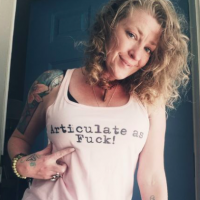
“Your body is not a temple, it’s an amusement park. Enjoy the ride.” ~ Anthony Bourdain
~
It’s wonderful to want a healthier relationship with our body.
It’s wonderful to want to feel at home in our skin. It’s wonderful to want to refine the way we engage with food—with nourishment. It’s wonderful to want to build strength, flexibility, and stamina. Let’s be mindful that we are not self-harming and dissociating in the process.
We have, as a culture, internalized ridiculous notions of what makes us socially acceptable. For men, it seems that the harder—more muscled, more successful you are—the more manhood can be claimed. For women, it seems that the less of us that manifests physically—the less space we take up, the less we weigh—the more socially acceptable we become.
It is time to flip this narrative.
There is a social and cultural obsession with being thin, hard, and defined. This pressure lands on men and women, alike, but women seem to feel it sooner and often have more of their sense of self-worth tied to their size, how they look, and what they wear.
Women are more susceptible to ageism and to sexism. Women are more inclined, and encouraged, to tie their worth to their image from a younger age. Modern women are expected to do it—to be it all. They are supposed to have thriving careers, be epic moms (shuffling their kids to endless soccer games in their top-of-the-line minivans), have pornstar sex lives, and be super model perfect, and still have dinner on the table at 5 p.m.
As I type those words, I feel a tremendous amount of pressure—anxiety—building up in my chest. My body rejects the fantasy of perfectionism even as the remnants of my social programming whimper, “But this is what is expected of you.”
I’ve worked hard to love my body. In my late 20s, I realized I had a form of body dysmorphia. I imagined my body to be way more bulky than it actually was. My own self-loathing and confusion distorted my self-image.
We are inundated with images of, allegedly, perfect bodies—many of them photoshopped. They’re not real and even when they are, those images do not reflect the internal reality or tell the story—or the cost of maintaining them.
Look around at any supermarket check stand and, likely, before you make it out the sliding glass doors with your reusable bag full of organic groceries, you will be confronted with a multitude of magazines with titles like: “Women Half The Size of what they Used to Be.” “Lose 28 Pounds in 28 Days.” Or, my favorite, “Celebrity Diets—How to Die Trying to be Liked.”
This kind of marketing is predatory. It is specifically designed to target people with a fragile body image and inflame a sense of low self-worth.
What if, however, it is not just the weight that leaves us feeling less than great? What if we are truly imprisoned by our own self loathing—a rejection of self that leaves us feeling unloved, unwanted, and burdened to the point of immobility.
From a biological and psychological standpoint, inflammation, pain, and subsequent numbing, are often what hold unwanted pounds to our frame. Often, carrying extra weight becomes a way to insulate against trauma—a way to get us to slow down enough to feel what is happening. Bodies are containers and when their sanctity has been breached, we need to relearn trust.
As a healer and hypnotherapist, I have worked with many people whose weight issues have roots in not being seen, heard, and validated. Food replaced care and comfort, and the extra weight became protection.
Our culture is inundated by the idealism of disappearing—our bodies and our inconvenient feelings. We need to claim what we feel in order to heal.
Positivity culture can be toxic too, and statements like: no low vibes here divorce us from our embodied existence and cause us to gaslight ourselves out of our lived experiences, while ascensionism drives us into fantasy land. Being here—in a body—for the hard and holy and human can be messy and yet so magical.
Real peace doesn’t really sell because when we are at peace with ourselves, no one can convince us that there is something wrong with us. No one can sell us our self-worth. We aren’t interested in some fix-it-all cure, spiritually or physically, because we know we’re not broken.
What would it be like, I wonder, if we decided that the greatest way to honor our own sacred life is to fully occupy this body?
Love for ourselves and others is not the reward that is reached once we have achieved some ridiculously impossible standard. Love is the fire through which we transmute all that clings to us that is not wholesome. This is not a spiritual or emotional bypass—this is real self-care. And the practice of it invites us to be honest and compassionate with ourselves and each other.
Often, when we are looking to be different, we embark on the journey of self-improvement from a place of self-aggression. We shame and bully ourselves into changing and then we wonder why those changes aren’t sustainable.
What if learning to love ourselves—exactly as we are—actually fired us up to burn through the layers of discontinuity?
Would you wait to begin to feel this love or would you give yourself permission—in this moment—to accept yourself? Would you walk into a room as if you own it, as if you were born to be in this body, as if it is your truest friend, lover, and companion—as if it were your partner?
Would you move, would you eat, would you dance as if you loved yourself, as if you belonged here? Would you carry your head high, your spine straight, acknowledging your legs as the powerful engines that move you through this life—that carry you where you want to go? Would you love your belly, your breasts, even your love handles? Would you handle yourself with more love?
The love and acceptance that we seek—the validation—will not come after a hundred workouts or finally achieving those rock-hard abs. The comfort that we seek—to feel alive, at home in our own body, in our own skin—is ours to claim right now.
Our own agency amplifies as we claim our energy and all that we are, were, or hope to be, rooting into well-tended soil as we learn to nurture ourselves—mind, soul, and body. The right to belong in this world is inherent—it is our birthright—no matter what sex, sexual orientation, ethnicity, or size we are.
Take a deep breath. Feel your hunger, your need, your desires, and all that fuels them. You are alive, real, and so beautifully worthy!
~


 Share on bsky
Share on bsky




Read 21 comments and reply